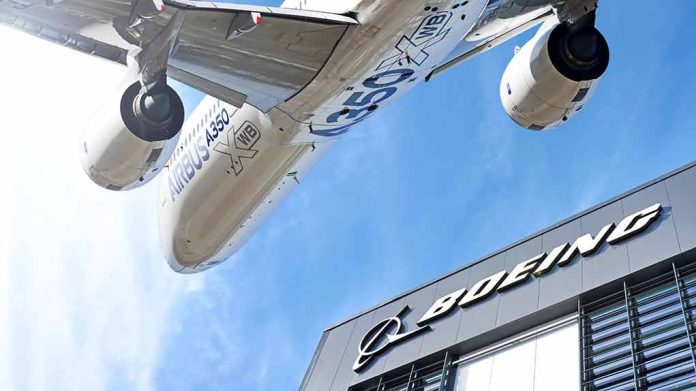
Boeing CEO Kelly Ortberg admitted to “serious missteps” in the company’s safety practices during intense Senate testimony, while firmly rejecting claims that production pressures compromised aircraft safety standards.
Key Takeaways
- Boeing CEO Kelly Ortberg acknowledged “serious missteps” in safety practices while testifying before the Senate Commerce Committee
- Following a January 2024 door plug blowout on a Boeing 737 MAX 9, the FAA limited the company’s production to 38 planes per month
- Ortberg, who became CEO in August 2024, outlined sweeping changes to Boeing’s safety culture and manufacturing processes
- Boeing faces a criminal fraud conspiracy charge related to two fatal crashes in 2018 and 2019, with potential fines up to $487.2 million
- Despite safety challenges, Boeing recently secured a major U.S. Air Force contract to build the next generation of fighter jets
Boeing’s Safety Failures Under Senate Scrutiny
Boeing CEO Kelly Ortberg faced intense questioning from the Senate Commerce Committee regarding the company’s recent safety problems and corporate culture. The hearing, scheduled by Sen. Ted Cruz, aimed to address Boeing’s rehabilitation efforts following a series of high-profile incidents, including a January 2024 door plug blowout on a 737 MAX 9 flight and two fatal crashes in 2018 and 2019 that killed 346 people. These events have severely damaged the aerospace giant’s reputation and prompted heightened regulatory oversight from federal authorities.
During his testimony, Ortberg directly acknowledged the company’s failures. “Boeing has made serious missteps in recent years – and it is unacceptable,” Ortberg stated. “In response, we have made sweeping changes to the people, processes, and overall structure of our company. While there is still work ahead of us, these profound changes are underpinned by the deep commitment from all of us to the safety of our products and services.”
Safety Reforms and Production Challenges
The Federal Aviation Administration has capped Boeing’s 737 MAX production at 38 planes per month following the January door panel blowout, which investigators determined was caused by missing key bolts. Transportation Secretary Sean Duffy has stated that Boeing lost public trust after this incident, which came on the heels of the two fatal crashes. The regulatory scrutiny has put enormous pressure on Boeing to demonstrate meaningful reforms in its safety culture and manufacturing processes.
“No one is more committed to turning our company around than our team. Working together, we are focused on connecting the world, protecting our freedoms and supporting our economy,” said Kelly Ortberg, Boeing CEO.
When directly questioned about production pressures potentially compromising safety, Ortberg pushed back firmly. “I’m not pressuring the team to go fast. I’m pressuring the team to do it right,” he testified. This statement contrasts with the assessment of Texas Republican Sen. Ted Cruz, who opened the hearing by stating that “efforts to cut corners in production or to move to the next production phase before necessary parts arrived have led to unacceptable failures.”
Legal Troubles and Leadership Changes
Boeing’s troubles extend beyond congressional scrutiny. The company is currently negotiating with the Justice Department over a revised plea agreement related to a federal fraud charge concerning the 737 MAX. Boeing has agreed to plead guilty and faces potential fines of up to $487.2 million. A trial date for this criminal case is set for June 23. When asked about the possibility of having a corporate monitor as part of any agreement, Ortberg stated, “I don’t personally have a problem, no.”
“The incident produced fresh doubt about Boeing’s ability to safely build planes,” said Texas Republican Sen. Ted Cruz during the hearing, highlighting the severity of the company’s challenges.
Ortberg, who took over as CEO in August 2024 after Dave Calhoun resigned following the door panel blowout, has been tasked with rebuilding trust in the iconic American manufacturer. His testimony outlined specific improvements in production lines, including reducing defects and risks, enhancing training, simplifying procedures, and elevating safety culture throughout the organization. He emphasized that leadership is now spending more time with employees and holding managers accountable for safety standards.
Boeing’s Future Amid Continued Scrutiny
Despite its ongoing safety challenges, Boeing recently secured a significant victory when the U.S. Air Force selected the company to build its next generation of fighter jets, surpassing competitors like Lockheed Martin. This $20 billion contract represents a crucial vote of confidence in Boeing’s future, even as the company continues to navigate its current difficulties. The Senate hearing revealed both the depth of Boeing’s problems and the company’s efforts to address them.
Critics, however, remain skeptical about Boeing’s ability to truly reform its culture. “I don’t think that they’re going to make real progress until they’re prepared to accept that the old culture was wrong. They can’t have it both ways,” said David Boies, highlighting the challenge Ortberg faces in creating meaningful change at Boeing. Family members of crash victims who attended the hearing continue to seek accountability for Boeing’s design and production flaws.
As the FAA continues to monitor Boeing’s manufacturing practices, maintenance protocols, and software updates, the company’s recovery remains uncertain. What is clear is that Boeing’s path forward will require more than just public statements – it will demand demonstrable improvements in safety practices and corporate culture to regain the trust of regulators, customers, and the flying public.






















